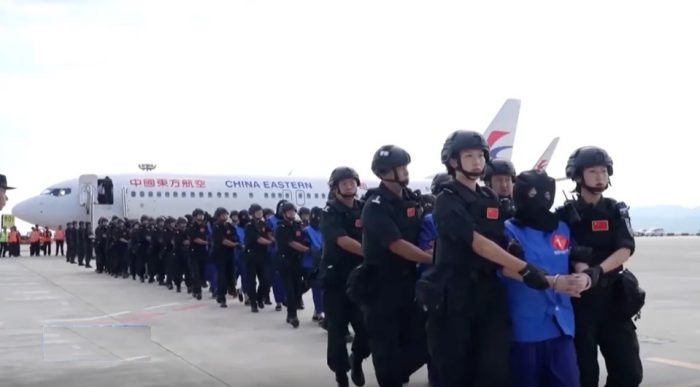China hunts its own crime lords as Myanmar’s billion-dollar scam syndicates collapse—revealing greed, brutality, and Beijing’s propaganda-fueled justice campaign.
The small, grim room is silent—except for the voice of a man who feels nothing.
“Should I feel anything?” asks Chen Dawei, his eyes cold and unblinking, hands cuffed tight.
Moments earlier, he calmly admitted to ordering a man’s murder—a “human offering” to celebrate a criminal pact.
This isn’t fiction. It’s real footage from a Chinese state documentary, a rare window into Beijing’s shadowy justice machine. The man on camera isn’t a petty crook; he’s a member of Myanmar’s most feared mafia family, the Weis—ruthless overlords of the border town Laukkaing, whose empire of casinos, brothels, and cyber-scam compounds bled billions from victims across Asia.
For years, the Weis, Bais, Mings, and Lius ran Laukkaing like their private kingdom—flashing luxury cars, lavish banquets, and political connections that stretched deep into Myanmar’s military elite. Beneath that glitz, their real business was human misery. Thousands of trafficked workers—many from China—were imprisoned in fortified scam centers, forced to defraud strangers online or face electric torture, starvation, or death.
But in 2023, their reign of terror ended.
Under intense pressure from Beijing, Myanmar handed over the godfathers. Chinese state media has since turned their downfall into a made-for-TV morality play—a propaganda blitz designed to both terrify and reassure. The message: No matter where you hide, China will hunt you down.
Eleven members of the Ming clan and five of the Bais have already been sentenced to death. The Weis and Lius await trial. Their mugshots, once symbols of swagger, now serve as warnings—modern “chickens” slaughtered to frighten the “monkeys,” as one investigator put it.
These high-profile trials are part of Beijing’s war on what it calls the “Scamdemic”—a web of cyber-fraud syndicates stretching from Myanmar to Cambodia, often masterminded by Chinese nationals themselves. That bitter truth has shattered public trust. “Once you’re abroad, the people you should least trust are your own countrymen,” one Weibo user lamented.
The shame runs deep. In China’s eyes, these cross-border scam lords have done more than steal billions—they’ve humiliated the nation, tarnishing Beijing’s global image just as it seeks to project moral strength. The state’s heavy-handed campaign, mixing real justice with propaganda theater, aims to reclaim that narrative.
More than 57,000 Chinese suspects have been arrested since 2023. Cyber-fraud complaints in China have dropped sharply, and state media triumphantly declares that “such crimes have been effectively curbed.” But behind the official optimism lies a darker truth: economic desperation and moral decay are feeding the same beast China claims to be slaying.
Still, Beijing’s message is unmistakable—the era of untouchable Chinese crime families is over.
The handcuffed man’s hollow words now echo as a warning:
“I didn’t feel much.”
For the victims who never made it out alive, and for the empire that collapsed on its own greed, those words are an epitaph.





